Scientific support
Scientific support
Lab of permafrost thermal physics
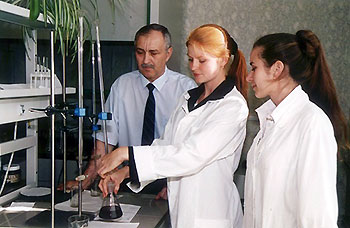 The lab provides for scientific research and engineering support for designing projects and construction of facilities for oil production and oil & gas transport on permafrost ground and in low temperature environment.
The lab provides for scientific research and engineering support for designing projects and construction of facilities for oil production and oil & gas transport on permafrost ground and in low temperature environment.
Areas
Scientific research:
- determination of thermal conductivity for various materials and soils;
- development of thermal protection methods and assessment of their effectiveness;
- studies of frost heaving forces including ones in enclosed space;
- determination of forces for soil adfreezing with various materials, development of anti-heaving measures;
- development of new design methods for soil thermal stabilization;
- studies and development of new software for solving thermal physics problems;
- studies of problems connected with flare open flame (flame physics, aerodynamics).
Engineering:
- Heat engineering for above-ground and underground gas, oil and water lines:
- determination of product temperature;
- determination of thawing halos;
- determination of soil settling;
- determination of distance between parallel lines;
- development of recommendations for thermal protection: selecting thermal insulation, replacing soil etc.;
- Heat engineering for oil, gas producers and RPM injectors. Determination of thawing halos for wells, product temperature at wellhead, distance between wells of well pad;
- Heat engineering for site facilities:
- tanks,
- underground tanks,
- piping,
- buildings and other installations.
- selection of safe process regime;
- layout of equipment;
- site preparation;
- measures to ensure the first and the second road construction principles.
- Prognosis of permafrost situation.
- Heat engineering for flare units. Determination of thawing halos, soil settling.
Development of recommendations for:- equipment thermal protection against flare radiation,
- selection of safe process regime,
- site preparation;
- Design study of facilities on permafrost ground:
- analysis of permafrost situation;
- recommendations on selection of road construction principle, soil stabilization in facility foundations.
- Determination of soil thermal properties.
Lab of field gathering, processing and transporting oil, gas and water
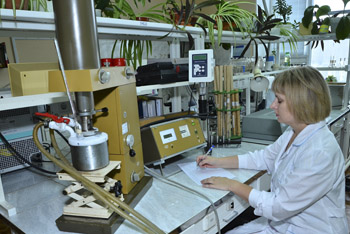 The lab provides for scientific research and engineering support for designing projects for gathering, processing (reaching the required quality indices) and transporting oil, gas and water.
The lab provides for scientific research and engineering support for designing projects for gathering, processing (reaching the required quality indices) and transporting oil, gas and water.
Lab is accredited for technical expertise by Accreditation System of Analytical Laboratories (Centers).
Areas
Scientific research:
- studies of physical and chemical properties of hydrocarbon liquids, water and oil emulsions; determination of oil, gas and gas condensate component and fraction composition;
- rheogoniometry of hydrocarbon liquids, water and oil emulsions;
- studies of emulsion properties for hydrocarbon liquids, suspensions; selection of chemicals and methods for obtaining and destructing water and oil emulsions;
- field survey of difficulties arising at gathering, processing and transporting oil, gas and water; identification of their causes, development of recommendations, methods for their elimination;
- development of scientific and engineering solutions for gathering, processing and transporting oil, gas and water, treatment of hydrocarbon gas and gas condensate;
- testing effectiveness and development of thermodynamic and kinetic hydrate formation and hydrate deposit inhibitors;
- comprehensive studies of oil, gas and water processing facilities and determination of the selected methods effectiveness.
Engineering:
- engineering systems for gathering, processing and transporting oil, gas, gas condensate and water with software HySys;
- engineering separation units, local processing facilities, central processing facilities, gas treatment units with software HySys;
- development of operating procedures for BPS, WPPS, LPF, CPF, OPF, GTU, oil loading stations, oil tank farms, gas storing facilities, liquefied hydrocarbons storing facilities;
- development of operating procedures for gas and oil products lines;
- feasibility analysis and studies when preliminary screening options for engineering and constructing facilities for gathering, processing and transporting oil, gas and water, options for use of associated oil gas;
- development of optimal options (scenarios) for transporting, processing and refining hydrocarbons from oil, gas and gas condensate fields (Plot Plans for industry development) for a region;
- design of non-standard processes and equipment for processing and refining hydrocarbon gas and gas condensate:
- development and scientific support of mathematical modeling and design of processes for processing and refining hydrocarbon gas and gas condensate;
- determination of parameters and basic structural dimensions for non-standard equipment.
Lab of field pipelines and environmental studies
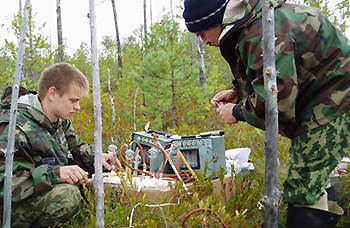
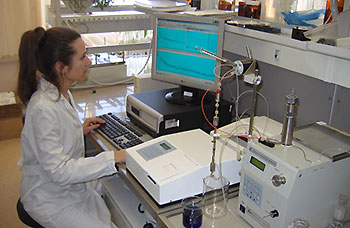 The lab provides for scientific research and engineering support for designing projects of pipeline systems and engineering-environmental survey (quantitative chemical analysis of environment components) including works for third parties under contracts.
The lab provides for scientific research and engineering support for designing projects of pipeline systems and engineering-environmental survey (quantitative chemical analysis of environment components) including works for third parties under contracts.
Lab is accredited by Federal Agency for Technical Regulation and Metrology for technical expertise and independence for radiological studies with the following accreditation area:
- Industrial area territory.
- Industrial and service buildings and premises.
Accreditation Certificate of test laboratory (center) in System of Radiological Control Labs
Areas
Scientific research:
- Quantitative chemical analysis of environment components and assessment of environment pollution when performing engineering-environmental survey. Sampling and quantitative chemical analysis of soils, surface waters, bottom sediments and air in impact area of oil and gas field facilities under design for developing EIA and environmental monitoring system.
- Radiological studies of the construction area when performing engineering-environmental survey. Measurement of total alpha and beta activity of surface, ground and underground water samples. Determination of radionuclide composition and activity of gamma-radiating radionuclide in samples of soils, bottom sediments, building materials.
- Lab and field scale inhibitor tests. Development of technologies for their application. Lab tests of scale inhibitor efficiency on model media, development of technologies for their application to protect well equipment and pipelines and field tests of scale inhibitors. Studies for creating high efficient scale inhibitor mix based on synergism.
- Lab and field tests of asphalt, resin, and paraffin deposit inhibitors. Development of technologies for their application:
- lab tests of asphalt, resin, and paraffin deposit inhibitor efficiency using coldfinger test for oil samples;
- development of technologies for their application to protect wells and pipelines;
- field tests of asphalt, resin, and paraffin deposit inhibitors;
- Studies for creating high efficient synergistic mixes of asphalt, resin, and paraffin deposit inhibitors.
- Quantitative chemical analysis of formation and produced water, deposits of corrosion products and inorganic salts in wells and pipelines to determine scale composition, studies of scale and paraffin depositing processes in pipelines and equipment and development of pipelines and equipment protection methods.
Engineering:
- Development of design & survey sections on field pipeline service life and reliability;
- Development of design & survey sections on service life and reliability of process pipelines at well pads;
- Determination of remaining life time and interval of rejection for oil and gas gathering and RMP systems;
- Development of pipeline system temporary abandonment projects;
- Development of operating procedures for field and main pipelines;
- Development of operating procedures for well pads;
- Development of emergency response plans for field pipelines;
- Development of emergency response plans for well pads;
- Consideration and validation of instructions on field pipeline cavity cleaning and strength testing;
- Development of process procedures for application of scale and paraffin inhibitors for pipeline and equipment protection.
Lab of corrosion protection of oil field systems
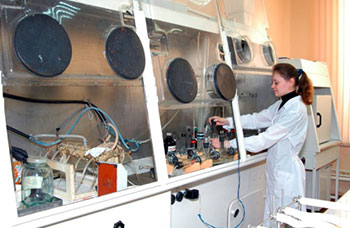
The lab provides for scientific research and engineering support for designing projects of field equipment corrosion protection.
Areas
Scientific research:
- Lab, bench and pilot tests of corrosion inhibitors, bactericides, scale inhibitors, hydrogen sulphide scavengers, combined effect inhibitors and other oil field chemicals;
- Assessment of corrosion situation of oil field facilities based on failure rate analysis, results of pipeline inspection and diagnostics, physical, chemical and bacteriological studies;
- Determination of causes of intensive corrosive wear and untimely failure of oil field equipment and development of recommendations on its protection;
- Determination of oil field media corrosive factors, assessment of pipe material erosive wear depending on medium composition and pipeline geometry, used materials and other factors;
- Tests of steel grades in various aggressive media, their rating according to test results considering chemical composition and structure characteristics;
- Analysis of corrosion control measures undertaken by oil producing company, identification of positive and negative points of existing practices;
- Assessment of protective properties of paint coatings to determine their application area based on coating physical and mechanical test results according to the following indices:
- chemical stability,
- adhesion,
- uniformity,
- hardness,
- impact strength,
- bending strength etc.
Engineering:
- Hydraulic design of oil gathering, processing and transporting systems to determine liquid flow regime and identification of potential hot spots;
- Development of process procedures for application of inhibitors in oil and water lines;
- Development of engineering solutions for corrosion protection of external and internal surface of tanks and vessels, intra-site and field pipelines;
- Development of corrosion monitoring system using both conventional and advanced methods for assessing oil media attack;
- Feasibility studies of various options of corrosion protection and determination of suitability of various materials and technologies.


